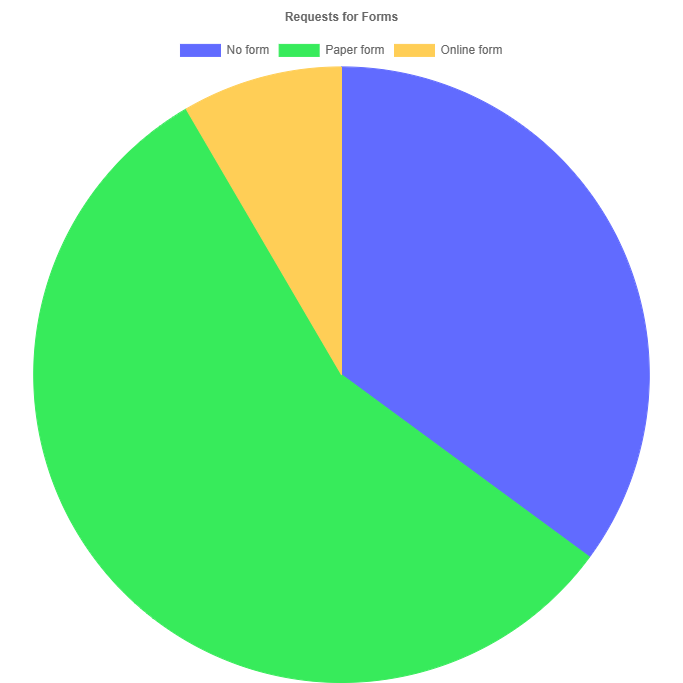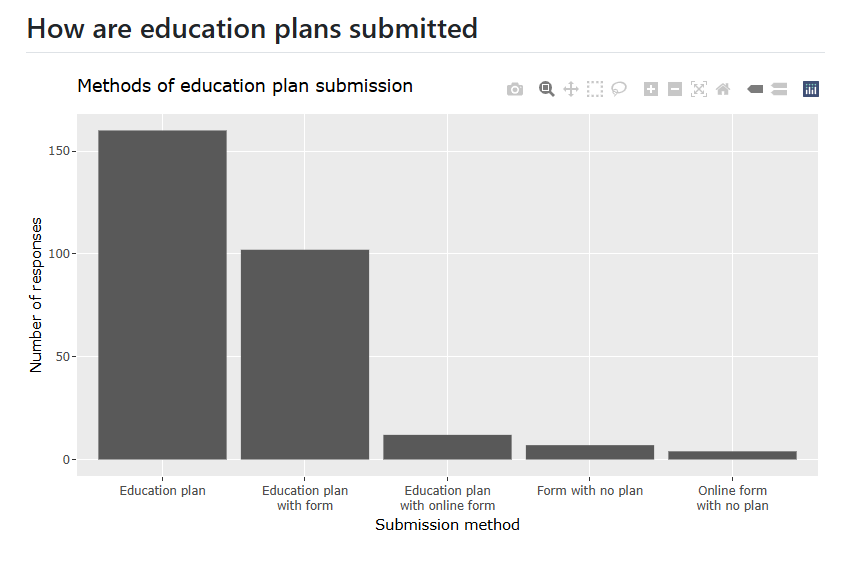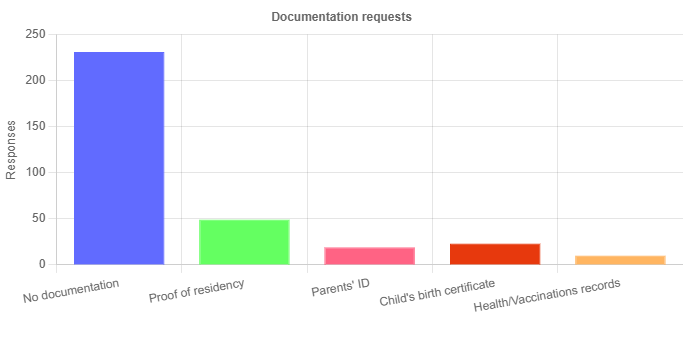Survey Results: Forms, Documentation, and Registration
We set up the survey to collect empirical data about:
- the use of online forms to submit education plans
- the request for documentation beyond an education plan
- the request to register a homeschooled student
We had responses from 285 homeschoolers in 50% of towns in Massachusetts. Thanks to all who took time out of their day to fill out the survey.
Use of online forms to submit education plans
Schools often use forms as administrative tools in an attempt to standardize information about homeschooled students. 185 respondents, 65%, report that their town asks them to fill out some sort of form or application in addition to their education plan. (You can read AHEM’s position on forms here.)

While towns asking for paper forms is not new, the use of online-only forms is new and may raise concerns if there are fields that cannot be skipped. Our survey showed that only 24 respondents (8% of total respondents) from 12 different towns reported that their town requests an online-only form. However, of these 12 towns that have online forms, at least some respondents from 10 towns reported that they are not asked for the online form and/or that they are able to use a paper form instead or simply to send in their education plan, leaving only two towns for which we cannot confirm whether the town will accept anything other than an online form. For both of these towns we had a very small sample size, one or two respondents only.
Despite the prevalence of forms, 56% of survey respondents submit just an education plan. Another 36% attach their education plan to a paper form provided by their town. Only 6.5% use an online form provided by their town (either with or without an accompanying education plan).

Request for documentation beyond an education plan
Fifty-four people, just over eighteen percent of respondents, said their town asks for supporting documentation. The most common documentation requested is proof of residency or occupancy (91% of those asked for documentation report this), followed by proof of parent's identity (35%) and child's birth certificate (43%). Nineteen percent of those asked for documentation report being asked for health or vaccination records. Such documentation is required to enroll a child in school, but historically has not been required to homeschool in the majority of Massachusetts towns. Nonetheless, the majority (92%) of those asked for documentation reported supplying some or all of what was requested.

Request to “register” a homeschooled student
The “registration” question appears to be a matter of semantics. Over time, perhaps due to the great influx of families choosing to leave the public school system over the last few years, the meaning of “registration” has muddied. One point that is crystal clear is that homeschoolers are not to be included in the enrollment count of public school students. Schools do not receive state funding for homeschooled students and including them in that count could be considered fraud.
Our survey found that some school personnel and some homeschoolers use “registration” to simply mean the ordinary process of being approved to homeschool. For some, “registering” seems to mean providing the excessive documentation mentioned above.
A better definition of “registration” which serves to keep the term distinct would be: entering the child into some form of database which tracks homeschooled children much as those enrolled in the public schools are tracked. If we limit “registering” to only this definition, our survey found that only 11 people (3.8%) from 9 different towns report something that might qualify as “registering” or enrolling.
Bottom line
The results of our survey show that much remains the same:
- Whether towns request forms/applications or not, most homeschoolers submit their own education plans, either alone or attached to a school's form.
- The request for online-only forms (i.e. forms that can only be filled out through an online portal) is newer. The number of towns requesting these sorts of forms is still small. While AHEM’s position is that forms themselves are a grey area, online forms raise additional concerns because they may contain required fields that cannot be skipped or that necessitate certain kinds of answers.
- Most do not get asked for any other documentation. Of those who do get asked for documentation, most comply. It is important to remember that district requests must be essential. Homeschool approval is distinct from the requirements imposed on those utilizing the public schools. Over the course of the last few decades, the vast majority of homeschoolers have not provided these kinds of excessive documentation so it would be very hard to argue that such requests are “essential” to approval.
- While the numbers are still very small, we are beginning to see towns requesting that homeschoolers be “registered” in the sense of being entered into online systems for tracking purposes. This is a new development and the implications have not been fully explored but on the surface it raises concerns about privacy issues at the very least. Again, district requests must be “essential” and it is hard to argue that any new request will meet this legal standard.
As always it is helpful to remember that schools are giant bureaucracies, and school personnel are often not familiar with homeschool law. Thus it falls to homeschoolers to read up on our rights and responsibilities, and gently educate school personnel.
